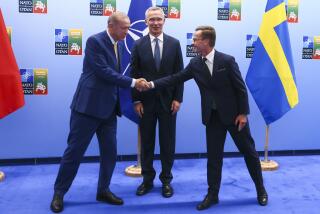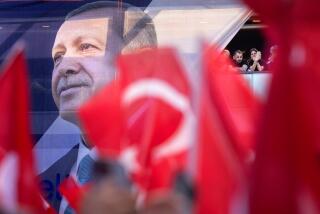Turkey Balks at Aiding U.S. Military Campaign
- Share via
ANKARA, Turkey — More than a month after hinting that it would facilitate a U.S. invasion of neighboring Iraq, Turkey’s leadership is leaning defiantly toward an antiwar stance, jeopardizing the Bush administration’s plan to open a northern front against President Saddam Hussein, diplomats and Turkish analysts say.
U.S. officials are warning privately, with growing insistence, that time is running out on any agreement to deploy Iraq-bound American troops in Turkey. Without their timely assent, Turkish officials say they are being told, the Bush administration cannot be counted on to help protect Turkey’s strategic interests during a war or cushion a blow to its economy.
Although a U.S. ground attack against Iraq would come mainly from Kuwait in the south, the Pentagon also wants a northern front in order to strike Hussein’s forces from different directions and to seize Iraqi oil fields near the northern cities of Mosul and Kirkuk.
Officials here say the United States is seeking approval to bring as many as 80,000 combat troops through Turkey for an operation in northern Iraq.
So far, both the Turkish military and the newly elected government have balked, citing strong public sentiment against an invasion and voicing skepticism that Hussein’s removal would bring Turkey any political or economic benefit.
The delays are starting to strain relations between the United States and its closest predominantly Muslim ally in the Middle East, with officials in both countries questioning the reliability of a strategic alliance that dates to the 1950s.
Turkey has yet to admit a 150-member U.S. military survey team for the first step in what would be a weeks-long process to upgrade its bases for the Americans, although a go-ahead is expected soon.
And Turkish officials have insisted that parliament, which by law must approve the stationing of foreign troops, won’t debate the issue until after Jan. 27, when the U.N. Security Council is to receive the report of inspectors now searching Iraq for evidence of weapons of mass destruction.
Western officials and analysts familiar with American preparations say the end of January might be too late to begin mounting a significant U.S. deployment in Turkey.
“We have given them one deadline after another, but they just don’t want to decide anything that will take them a step closer to the playing field,” one Western diplomat said.
“You get to the point where you can no longer wait for clarity,” another diplomat said. “The process has to come to some sort of conclusion.”
Turkey is a member of the North Atlantic Treaty Organization. But a major lobbying effort by the Bush administration has failed to assuage Turkey’s apprehensions about a war in Iraq.
Turkish leaders have said a war might bankrupt their country, expose its cities to Iraqi retaliation, break up Iraq and clear the way for an independent Kurdish state on Turkey’s southern border. That, they argue, could revive a Kurdish insurgency that claimed thousands of lives in Turkey in the 1980s and ‘90s.
The U.S. has promised financial assistance and assured the Turks that they would block creation of a Kurdish state from Iraq or a Kurdish seizure of northern Iraqi oil fields.
Deputy U.S. Defense Secretary Paul D. Wolfowitz thought he finally had Turkey on board early last month when Foreign Minister Yasar Yakis gave a tentative OK to the use of Turkish bases in the event of war. Wolfowitz left the Turkish capital, Ankara, with what he called “a common understanding.”
But Yakis retracted his offer as other members of Turkey’s new government, elected in November, began speaking out against a war.
The ruling Justice and Development Party has Islamist roots but has promised to maintain Turkey’s strategic alliance with the West. Having swept to power on a pledge to end this country’s 2-year-old financial crisis, the party finds itself grappling instead with the prospect of a potentially costly war on its doorstep.
Turkey’s economy slumped as a result of the 1991 Persian Gulf War when Iraq, one of its main trading partners, came under international sanctions.
Turkish officials say the United States has proposed a package of grants and loans worth up to $14 billion to offset the effects of any new war. Some members of the ruling party have criticized it as too little and demanded commitments of up to $60 billion.
“They’re painting a very negative picture of what could happen,” a Western diplomat said. “We try to persuade them that, with their help, the war could be over quickly, but they won’t look at it that way. To be fair, it’s a tough call.”
U.S. officials have begun emphasizing that Washington is prepared to invade Iraq without a northern front. In that case, the Turks say they are being told, Turkey could suffer economically anyway -- and Congress might not approve the aid package.
Without a northern front, the U.S. also reportedly warns, it would be less able to control the Kurds in northern Iraq.
“The Americans are issuing a veiled threat, telling us, ‘Unless you take part in the war, you will have no guarantees,’ ” Maj. Gen. Bekir Kalyoncu of the Turkish armed forces general staff told a closed parliamentary hearing this week, according to Turkish newspapers.
Kalyoncu told parliament that it was time for civilian leaders to make a “political decision” on whether to help the Americans.
Prime Minister Abdullah Gul told Turkish newspaper editors last week that his government is in no hurry to make up its mind.
“Of course [the Americans] say, ‘Decide immediately,’ but we say, ‘You haven’t decided yet, so why do you expect us to rush?’ ” he said.
Some lawmakers have called for a referendum on a possible war -- a move certain to eliminate any chance of Turkish help for the United States. According to one poll last week, 87% of Turks oppose a U.S. invasion of Iraq and 63% don’t want Turkey to open its bases for one.
“The Americans want to invade Iraq to take its oil,” said Adnan Tasdemir, a 41-year-old hardware store owner in Diyarbakir, 130 miles from the Iraqi border, in a typical comment. Tasdemir, who is stocking gas masks to sell in the event of war, added, “The oil is their main target, and no one in Turkey will benefit.”
Gul has spent weeks emphasizing that his government is “doing everything it can to avoid a war.” To that end, he visited Syria, Egypt and Jordan on a diplomatic mission this week and plans to go to Iran and Saudi Arabia this weekend.
“There has been an assumption by the Americans that the Turks would come along, but that hasn’t happened,” said Bulent Aliriza, an analyst at the Center for Strategic and International Studies in Washington.
“So you have to draw the conclusion that the Turks really mean what they say: They don’t want this war; they don’t want to participate in this war. They seem determined to run out the clock so that it becomes too late to get involved.”
More to Read
Sign up for Essential California
The most important California stories and recommendations in your inbox every morning.
You may occasionally receive promotional content from the Los Angeles Times.













